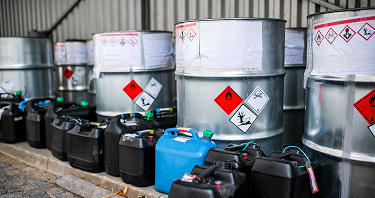 Spill Prevention, Control, and Countermeasures (SPCC) Plans are required, under the authority of the Clean Water Act, to be in place for facilities that (a) are non-transportation related, (b) have an aggregate aboveground storage capacity greater than 1,320 gallons or a completely buried storage capacity greater than 42,000 gallons, and (c) there is a reasonable expectation of a discharge into or upon navigable waters of the United States. Since we meet these requirements, Georgia Tech is required to have an SPCC plan that is updated every five years. As the name of the plan states, the purpose is to prevent and control spills as much as possible. This could mean placing drums on spill pallets or some other secondary containment control measure, or having a spill kit near oil storage sites. To learn more about SPCC plans, click here.
Spill Prevention, Control, and Countermeasures (SPCC) Plans are required, under the authority of the Clean Water Act, to be in place for facilities that (a) are non-transportation related, (b) have an aggregate aboveground storage capacity greater than 1,320 gallons or a completely buried storage capacity greater than 42,000 gallons, and (c) there is a reasonable expectation of a discharge into or upon navigable waters of the United States. Since we meet these requirements, Georgia Tech is required to have an SPCC plan that is updated every five years. As the name of the plan states, the purpose is to prevent and control spills as much as possible. This could mean placing drums on spill pallets or some other secondary containment control measure, or having a spill kit near oil storage sites. To learn more about SPCC plans, click here.
Several buildings on campus have some type of oil storage addressed in our site-specific plan. It covers all types of oil storage, including cooking grease containers. If you ever see oil leaking out of a container here on campus, please let us know immediately!
If you live on private property, such as in a Fraternity or Sorority house on campus, and you have cooking grease storage, you most likely are not part of our SPCC plan. Please keep in mind that you are required to adhere to the same regulations.
When it comes to cooking grease and waste oil, here is a list of some good rules to stick by:
- Seal and contain food wastes to ensure they do not leak from solid waste containers and dumpsters
- Never dump food wastes into a stormwater drain or drainage ditch
- Perform equipment cleaning indoors or in a covered outdoor wash area connected to the sanitary sewer
- Use dry methods for cleaning outdoor areas whenever possible
- Recycle and/or properly dispose of fats, oils and grease
- Ensure fats, oils and grease containers are properly covered and sealed